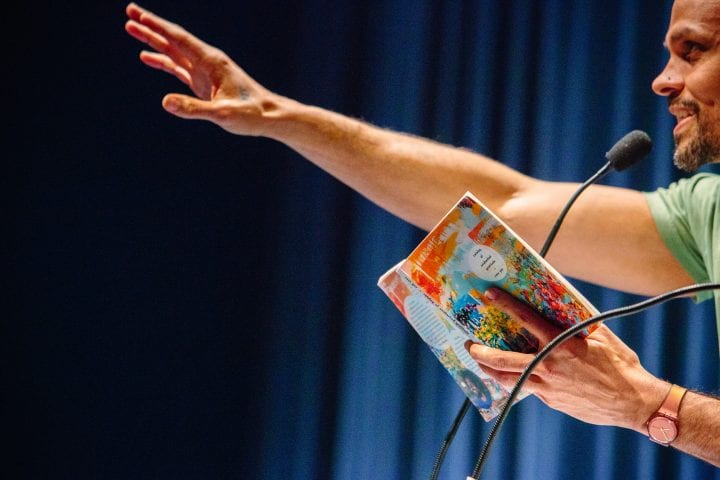
Next on the SAL Podcast: Ross Gay
April 9, 2020
In our latest episode of SAL/on air, our literary podcast featuring talks from across Seattle Arts & Lectures’ thirty years, we hear from poet Ross Gay.
In a time like this, where do you look to for joy? In an episode of Krista Tippett’s podcast, On Being, poet Ross Gay recently said, “It is joy by which the labor that will make the life that I want, possible. It is not at all puzzling to me that joy is possible in the midst of difficulty.”
Besides being a disciple of joy, Ross Gay is a gardener, a painter, a professor, a basketball player, and a founding member of the Bloomington Community Orchard, a free-fruit-for-all non-profit focused on food, justice, and joy. He is also the author of three collections of poetry.
The title poem in his most recent, Catalog of Unabashed Gratitude, is a long piece which, Ross told the Los Angeles Times, was begun as a “way to publicly imagine what it means for a person to be adamantly in love with his life. I wanted to realize joy as a fundamental aspect of our lives and practice it as a discipline.”
Listen to the episode or read a full transcript by clicking the button below, or tune in wherever you get your podcasts (and don’t forget to “like” and subscribe!). But, if you don’t have time to listen to Ross speak, here are some highlights from his reading.
Reading Highlights
On cultivating joy
I’m a sort of a melancholy dude, actually. To me, joy is this—I love the life of meditating on what joy is. First of all, I feel like joy is a kind of discipline, you know? And joy, to me, is something like this: understanding that everything is going away. We are fading as we speak, right? And everything we love. Maybe the thing that is joy is recognizing that there is a fundamental connection between us. It’s a fundamental connection between us, and to recognize that, and that it’s like a forest. We’re all connected by those things. It’s a kind of nourishment.
On delight
Part of the game is that attending to what delights you is a muscle, and if you do a lot, you’re gonna do it a lot… It’s like doing push ups and it’s real—if I write them often enough, I write four in a row, five in a row, six in a row, seven in a row. There’ll be days when I’m walking down the street, and I’m like, Oh, that’s a delight. That’s what I want my life to be, you know? I’d say a hundred things that delight from this morning: the toast, orange juice from concentrate—delightful.
On essayettes
I’m writing this book of little essayettes. It’s a good name for a little essay. When I read a few someplace, someone said essayettes and I said, Oh, that’s good one. And they are, like little things, and I decided, I’m calling them “Delights.” I try to write them all the time.
I want to read you this delight that I wrote today. It’s called “Just an Observation.”
Though an observation may not feel as though it qualifies as a delight, it is sometimes delightful to observe—that’s all—though the observation I’m making here is not particularly. I have been carrying around in my front left pocket for the last week or so, and consequently have probably developed some kind of wasting disease in the hip flexor or femur or other equally urgent and tender organs around there, a little photo from the New York Times of Mike Pence, Mitch McConnell, and Neil Gorsuch. I immediately noticed that these three silver-haired men (how ‘good old days’ it must feel to them), who were all posing for a photo, or photos, and were presumably smiling, were actually frowning. I mean, their smiles are frowns.
On essayettes versus poems
What I like about the essay as a form is that it is, in a way, formless. It’s whatever you want to do. Whereas poems, they’re actually really sort of intensely made things. Poems have a kind of understanding of the form or practice in the form, such that they’re still tremendously surprising to me. Every poem I write is kind of surprising. But essays are things that I don’t know how to write. I really don’t know how to write essays, and I’m into doing stuff that I don’t know how to do.
On post-2016 election feelings
Part of it is, you know, working. Like doing shit. But also meditating in a very real way on the collaborations that we’re going to do, that we are already doing and we’re going to be doing that will be really incredible and beautiful. I feel like there’s a different kind of tenderness that might be emerging. And where this sort of deep connection to one another might become even more present. So I’m obviously scared and all of these other things and I’m also very curious about what we’re going to do. I’ve seen such a beautiful sort of solidarity.
On favorite foods to grow
I get a thrill out of growing greens across the board. Partly because I love eating greens, and partly because I love eating my own greens from April to December—that just makes me so happy. I love growing garlic. It does not stop fascinating me that you stick one clove in and it turns into a bulb. It’s crazy. Seeds are crazy. And I love other plants too. Potatoes. I mean potatoes are ridiculous, right?